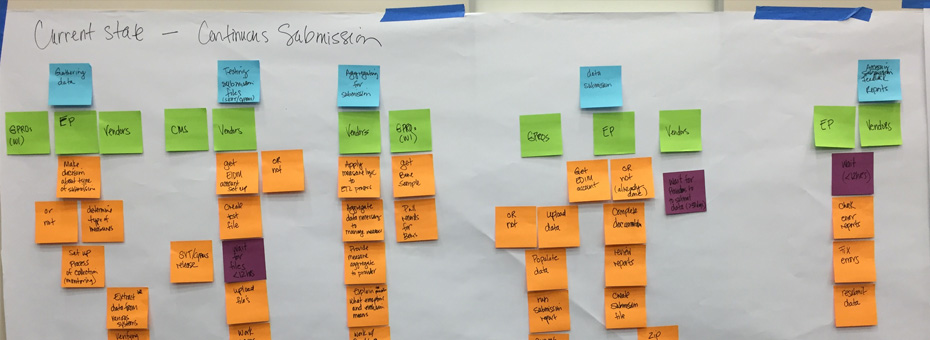Faced with a new incoming healthcare policy, Mindy Hangsleben and her team at the Centers for Medicare and Medicaid Services knew a transformation was needed. Their solution to learning what they needed to become involved a strategic design event incorporating both lean and design thinking to gain the input they needed to adapt to the new policy. The Article recently sat down with Mindy to learn more details about this event.
I understand you began this journey based on a new federal healthcare policy that was coming down the line. Can you describe what the policy involves?
It’s called the Medicare Access and CHIP Reauthorization Act of 2015, or MACRA, and it created a new quality program called the Merit-Based Incentive Payment System or MIPS. It accelerated the transition from paying for volume of services delivered to a system that rewards healthcare providers for the value of services delivered. And in order to get the policy up and running, other new systems and operations need to be created.
What would you say is the biggest challenge in adapting to a policy that affects so many people?
It’s exactly that – CMS has so many stakeholders who will be affected by this new policy. We have millions of patients and millions of medical and transactional professionals who will be impacted. And then there are members of Congress and other stakeholders involved in the creation of the legislation who have a lot at stake in seeing the rollout of the policy. So the biggest challenge was trying to find out who we needed to engage in order to make a system that would satisfy everyone’s needs.
How did you end up deciding to use lean and this strategic design event to generate solutions?
It first started when the MACRA legislation passed. One of our policy writers contacted me and said, “So about this new policy that’s coming out – I want us to think differently about it and approach it using lean methodologies. Can you do that?” I wasn’t 100% positive it would work, because we were more used to applying lean to improve pre-existing processes, not create something from scratch. But I said, “I think we can. Let’s just try it and see if we can learn more about our stakeholders’ needs.” And the strategic design event was the solution we came up with together, to use both lean and human-centered design to learn more about our gaps so we could design something new and give our stakeholders a better experience.
How did you identify the right people to take part in the event?
Before anything else, our team started out by looking at the provisions of the new law – we wanted to look at our current operational capabilities and think about what might have to change under the new terms. We looked at each process that the law would require and thought about which users and stakeholders would be impacted by it. We identified all these different stakeholder types and invited them to this four-day strategic design event. We also planned the event to coincide with CMS’s national Quality conference, which many of our stakeholders and other parties attend, so we could get that added participation.
What did the event consist of?
We structured it sort of like a kaizen event. Once everyone was in the event room we broke them up into groups based on their areas of expertise:
- Communications – Education and Outreach
- Help Desk
- Registration and Eligibility
- Continuous Feedback
- Feedback Reports
From there we did some demos and direct observations that showed similar processes that would be changing under the new program and opened the doors to discussing what we would need in order to adapt to it. Each group mapped out their current state, identified their customers, and then created an initial system design. Then they used user feedback and business metrics to refine those designs.
We left that event with a really good understanding of where our gaps were, plus a good list of needs to address. For example, we got about two pages of requirements for a new MIPS mobile app from the Communications – Education and Outreach group. The Help Desk group wrote up some specifications to ensure users with inquiries have a good experience when contacting us, such as offering multiple options for contact (email, phone, live chat, etc.), enabling them to request a callback at a specified time, and connecting them to a live person within three minutes. And we’re going to use as much of that input as we can to design our new MIPS program.
Based on what you got out of this design event, would you encourage others to do it as well?
Absolutely, especially in the sense of identifying and bringing in your direct stakeholders. When you’re so far away from your ultimate customer, being able to put yourself directly in their shoes is invaluable. It gets you away from the “waterfall mindset” that is often present in government, in which we think we know exactly what people want, but we never actually go to see it for ourselves. And that just makes it an educated guess at best.





